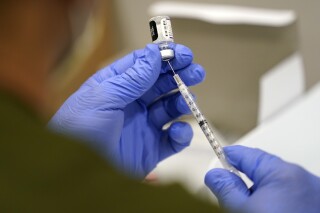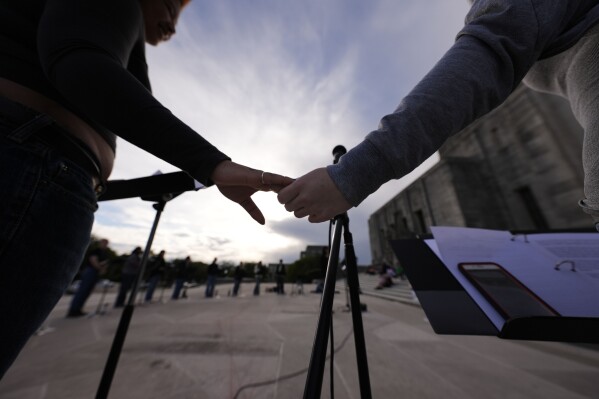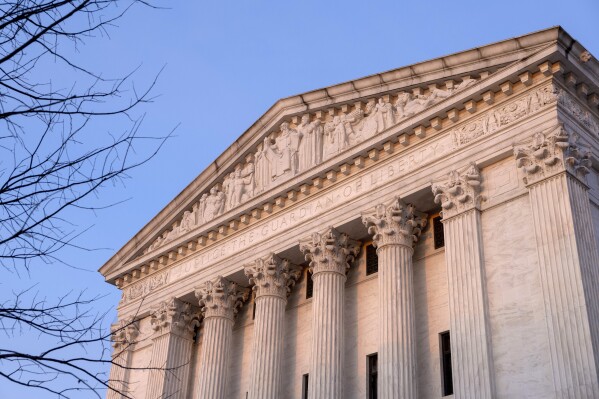Louisiana debates civil liability over COVID-19 vaccine mandates, or the lack thereof

FILE - A healthcare worker fills a syringe with the Pfizer COVID-19 vaccine at Jackson Memorial Hospital, Oct. 5, 2021, in Miami. Three years after COVID-19 vaccines became widely available in the United States, Louisiana continues to debate policies related to inoculation mandates, including civil labilities if a work place mandates vaccines or not and a bill that would prohibit schools from requiring students to receive the vaccine. (AP Photo/Lynne Sladky, File)
BATON ROUGE, La. (AP) — Three years after COVID-19 vaccines became widely available in the United States, Louisiana continues to debate policies related to inoculation mandates, including civil labilities if a work place mandates vaccines or not and a bill that would prohibit schools from requiring students to receive the vaccine.
The ongoing debates, which are often marred by anti-vaccination rhetoric, come on the cusp of relaxed guidelines from the Centers for Disease Control and Prevention and COVID-19 no longer being the public health menace it once was. This legislative session, Louisiana lawmakers’ conversations on COVID-19 vaccines have broadened to also apply to “experimental or emergency use vaccinations” for fear of future pandemics.
Louisiana’s GOP-controlled House passed a bill Wednesday that protects businesses from being sued because they don’t mandate “experimental or emergency use vaccines” including COVID-19 shots.
Under the proposed legislation, if a person believes they got sick from contact at a business, they would be unable to file a lawsuit against the business.
Rep. Danny McCormick, who authored the measure, said the bill would “do away with any frivolous lawsuits.” The Republican added that it would be difficult to directly pinpoint, before a judge, where or from whom a person contracted COVID-19. Opponents of the bill, such as Democratic Rep. Denise Marcelle, said while that is true, McCormick’s bill wouldn’t give people the chance to even reach that point.
The legislation passed mainly along party lines and now heads to the Senate.
In a narrow vote, the House rejected another bill that would allow people who “suffer from vaccine injuries” to sue their school or employer if they are required to receive a COVID-19 vaccine as a condition of employment.
Louisiana GOP Rep. Mike Echols, who authored the bill, said he knows of several constituents who “died or were maimed and injured” by the COVID-19 vaccine. Across the country, conspiracy theorists and anti-vaccine activists have incorrectly and baselessly blamed the injuries and deaths of hundreds of children, teens, athletes and celebrities on COVID-19 shots. Deaths caused by vaccination are extremely rare, and rigorous study and evidence from hundreds of millions of administered shots have proven COVID-19 vaccines are safe and effective.
The bill received an influential note of disapproval from a powerful lobbying organization that represents business industry interests, describing the measure as “harmful to the long-established purpose of workers compensation throughout the country.”
The bill failed 51-50, but Rep. Echols said he plans to bring the measure back in another attempt of passage.
This session, the GOP-dominated legislature will also take up a measure that would prohibit schools from requiring students to get COVID-19 vaccines.
A nearly identical bill easily won legislative approval last year, but was vetoed by then-Gov. John Bel Edwards, a Democrat. Since then, conservative Gov. Jeff Landry has taken office.
In his veto message, Edwards said the bill is “unnecessary” as the vaccine is not mandated by the state. In addition, Edwards said the measure “seeks to undermine public confidence” in COVID-19 vaccines.
Arguments in Louisiana’s capitol echo those from statehouses throughout the country since COVID-19 vaccines became widely used in 2021. Vaccines have helped to dramatically reduce instances of serious disease and death from COVID-19.



